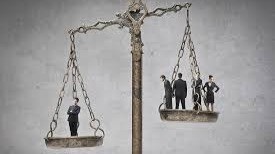Blog
When Power Reveals True Colors: The Metamorphosis of Relationships and Minds

It is fascinating, and sometimes a little unsettling, to see how much people change once they are promoted or gain a bit of power. What is truly surprising is how quickly their intellectual abilities and judgment seem to transform—unfortunately, often for the worse. Instead of becoming wiser or more thoughtful, many fall into traps of arrogance, narrow-mindedness, or condescension. This phenomenon highlights a troubling truth: it is relatively rare to see individuals use their new position to grow positively by showing greater open-mindedness, kindness, or humility. Exceptions exist, of course, but they are too few.
A particularly revealing aspect of this transformation is how these individuals interact with their friends or employees once they have reached a certain status. It is striking to see how many relationships, once based on equality and camaraderie, become unbalanced. Some start treating their friends with a certain distance, as if they are now above their former companions. Others, as leaders, suddenly become more demanding and less empathetic toward their employees, forgetting the challenges they themselves once faced.
This ascent can create a chasm between them and their surroundings, a gap that is difficult to bridge. Friends who were once close may feel neglected or undervalued, while employees may lose motivation and respect for a superior who seems to have lost touch with reality. As Lord Acton famously said, “Power tends to corrupt, and absolute power corrupts absolutely.” It is a sad evolution that shows how power, when not accompanied by wisdom and humility, can not only corrupt the person who holds it but also deteriorate the most precious relationships.
Ethics and Deontology: The Guardian of Integrity in Promotion
When an employee is promoted due to their abilities, they are generally recognized for their technical skills, performance, and potential to lead. However, a promotion should not only be a recognition of professional skills but also a test of moral strength and personal integrity. This is where ethics and deontology play a crucial role.
Ethics: A Guiding Principle for New Responsibilities
Ethics represent the set of moral principles that guide an individual’s actions and decisions. For someone recently promoted, ethics become an essential guide to navigate increasingly complex situations, where decisions can have significant consequences not only for themselves but also for the team and the organization as a whole.
An ethical leader is aware of the impact of their actions on others and the professional environment. They understand that the power entrusted to them must be exercised with great responsibility, taking into account values of justice, fairness, and respect. This means being transparent in decisions, avoiding conflicts of interest, and always acting in the best interest of the team and the company.
Deontology: A Framework to Preserve Fairness and Integrity
Deontology, on the other hand, concerns the specific rules and standards governing a profession or particular role. For a promoted employee, adhering to a strict code of ethics is essential to maintain the trust of colleagues and subordinates.
A failure in deontology can not only tarnish a leader’s personal reputation but also harm the entire organization. This is why it is important for a newly promoted individual to familiarize themselves with the ethical expectations of their role and rigorously uphold them. This includes confidentiality, impartiality in decision-making, and respect for internal procedures.
The Importance of Exemplarity
Being promoted also means becoming a role model for others. A leader’s ethical and deontological behavior will influence the team’s norms and culture. By setting an example, a leader can inspire their colleagues to adopt the same high standards of conduct, thereby creating a healthy, respectful, and productive work environment.
The Consequences of Ethical Leadership
An ethical leader creates a work environment where trust prevails, which can improve team cohesion, job satisfaction, and, ultimately, the overall performance of the company. By acting with integrity, a leader boosts employee morale and lays a solid foundation for lasting professional relationships.
Managing Ethical Dilemmas
It is inevitable that a leader will face ethical dilemmas, where they must choose between short-term results and the long-term well-being of the team. In these moments, it is crucial to respect ethical principles, even when decisions are difficult. An ethical leader knows that sustainable success depends on decisions that honor the organization’s core values.
Ethics in Decision-Making
Ethics must be integrated into every step of the decision-making process, from evaluating options to implementing decisions. Transparency and communication are essential to ensure that decisions are made in accordance with ethical principles, thereby contributing to a climate of trust within the team.
The Role of Deontology in Professional Relationships
Deontology influences not only hierarchical relationships but also interactions among colleagues. Respecting ethical standards reinforces a work environment based on mutual respect and fairness. By following these rules, a leader creates an environment where every team member feels valued and respected, fostering a culture of excellence.
Conclusion:
This text highlights the potential dangers of power when not accompanied by wisdom, humility, and a strong ethical foundation. The transformation of relationships and behavior following a promotion is a real and sometimes concerning phenomenon. However, it is possible to overcome these challenges by adopting an ethical leadership approach and actively committing to upholding high deontological standards. This not only protects the leader’s integrity but also strengthens professional and personal relationships.
For those who wish to avoid the pitfalls of power and become exemplary leaders, it may be beneficial to seek guidance from a professional coach. A coach can offer valuable insights, help develop ethical leadership skills, and provide support in successfully navigating the complexities of new responsibilities. Through personalized coaching, a leader can not only maintain their values and integrity but also inspire and motivate their team to reach new heights.
BH082024
Related Posts

Article By:
Bernard Houppertz
Bernard Houppertz is a seasoned hotel industry professional with over 25 years of experience. He has received numerous awards for his achievements and has led operations for world-leading Hotel Groups. He served as the Vice President Development & Operations South Asia & Africa at Cygnett Hotels and Resorts, and is also the CEO at FitFinder4.0, a platform designed to help hotels increase their revenue.

